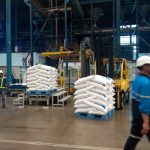Islamabad: The Federal Board of Revenue (FBR) has imposed hefty fines on 10 sugar mills for violating tax regulations, with similar action against 10 more mills expected soon, reported Dawn.
This move comes as the 2024-25 sugarcane crushing season begins, during which the FBR introduced a system to monitor sugar production closely. As part of the crackdown, five sugar mills in Sindh and five in Punjab were fined for tax violations, leading to the recovery of millions of rupees in taxes and penalties from the mills.
In a related development, nine FBR officials were suspended for alleged involvement in malpractice. They were accused of collaborating with sugar mill operators to evade taxes, according to reports from monitoring agencies.
To promote transparency, the FBR rotates tax officers at sugar mills every 10 days and monitors their performance using a digital system. The oversight process includes track-and-trace stamps, automated counters to count sugar bags, video recording and digital counting, tracking invoicing for sugar dispatches, and on-site FBR staff supervising production and sales.
“We have identified 10 more sugar mills for breaking tax laws,” an FBR official told reporters. He said these mills would face fines and asset seizures to ensure better compliance in the sugar sector.
The Federal Investigation Agency (FIA) and the Intelligence Bureau (IB) are also monitoring the sugar industry. Pakistan has 80 sugar mills producing sugar for domestic consumption and export. This year’s sugarcane harvest is projected at 70 million tonnes, expected to produce about seven million tonnes of sugar. Combined with an opening stock of over one million tonnes, the country’s sugar supply is well-positioned for the season.
To strengthen oversight, the FBR has deployed integrated CCTV cameras at sugar mills and conducts frequent inspections by senior officials. The inland revenue enforcement team also carries out field inspections, supported by police and Rangers for security. During last year’s crushing season, FBR’s on-site presence at sugar mills helped reduce sugar smuggling, stabilize sugar prices, and ensure a steady supply.
Recent enforcement actions highlight the FBR’s intensified crackdown. In Lahore, the Large Taxpayers Office (LTO) sealed a major sugar mill for failing to install cameras and refusing to hand over its Network Video Recorder (NVR) to FBR officials. Production at the mill was suspended until the cameras were installed and legal requirements were met.
In Khushab, the LTO sealed the godowns of a sugar mill to check its stock and inspect for unstamped sugar bags. Meanwhile, the FBR is preparing to take action against a sugar mill in Faisalabad for non-compliance with legal requirements.
In Shaheed Benazirabad, Sindh, the Karachi LTO discovered a concealed production chute at a sugar mill. Hidden behind a high brick wall, the chute had not been declared to the FBR’s monitoring system. The FBR sealed the chute and seized 1,200 tonnes of sugar produced through it. The action resulted in the collection of Rs25 million, which included a 300% penalty and sales tax.
In Mirpurkhas, Sindh, FBR officials at a sugar mill reported that the mill’s management refused to hand over its NVR, a violation of sales tax rules. A 20-member team from Karachi LTO sealed the production chutes. The mill’s management later paid a penalty of Rs0.5 million to have the chutes unsealed.
In Tando Allahyar, Sindh, the FBR found that a sugar mill had disconnected its production chutes from the monitoring system. Aided by the Hyderabad office, a team from Karachi LTO sealed all production chutes at the mill. They also confiscated 150 tonnes of untaxed sugar and impounded five vehicles used to transport it.
The FBR’s crackdown on tax violations in the sugar sector is seen as a significant effort to ensure compliance, prevent tax evasion, and stabilize the sugar market. These ongoing actions are expected to set a precedent for greater accountability in the industry.












